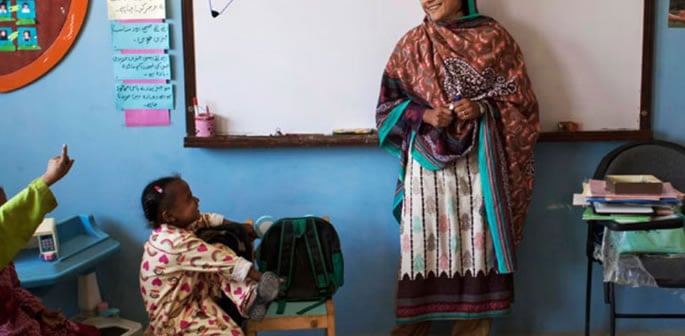female teachers are now required to wear traditional shalwar kameez
The Punjab School Education Department has introduced a new dress code policy for teachers across both government and private schools.
Announced on April 8, 2025, the guidelines aim to promote professionalism and cultural appropriateness within educational institutions.
According to the policy, male teachers will no longer be allowed to wear jeans and T-shirts during school hours.
Meanwhile, female teachers are now required to wear traditional shalwar kameez paired with a dupatta.
The department emphasised that this dress code is designed to create a respectful and professional learning environment.
Along with the dress policy, the Punjab Education Department has also directed schools to make arrangements for Zuhr prayers during school hours.
This ensures that teachers and students can observe their religious duties in a respectful manner.
The department’s move mirrors similar initiatives seen in other provinces, including Sindh.
Sindh introduced a comprehensive code of conduct for teachers in March 2025.
The Sindh Education Department’s guidelines share several similarities with Punjab’s new policy.
Female teachers are encouraged to dress in traditional clothing, avoiding heavy makeup, high heels, and excessive jewellery.
Male teachers are similarly advised to refrain from casual attire such as T-shirts and jeans.
In addition, the Sindh policy prohibits the consumption of tobacco products, including cigarettes and chewable tobacco, during school hours.
The department also made it clear that teachers must not assign personal tasks to students, ensuring that the classroom remains a professional space.
Both Punjab and Sindh education authorities have stressed the importance of maintaining professionalism and discipline in schools.
They believe that attire and personal conduct play a vital role in setting a positive example for students.
By enforcing these policies, the education departments aim to create an environment that promotes respect, focus, and ethical standards.
Public reaction, however, has largely been negative.
Many people, especially those from the education sector, have opposed the changes.
They argued that the focus should be on improving the quality of education rather than controlling personal appearance.
Some critics see the policy as an unnecessary distraction that undermines the freedom of teachers to express themselves.
They stress that professionalism should be maintained in other areas, such as classroom behaviour and teaching effectiveness.
Concerns have been raised that such rules could create a rigid and stifling atmosphere for both teachers and students.






























































